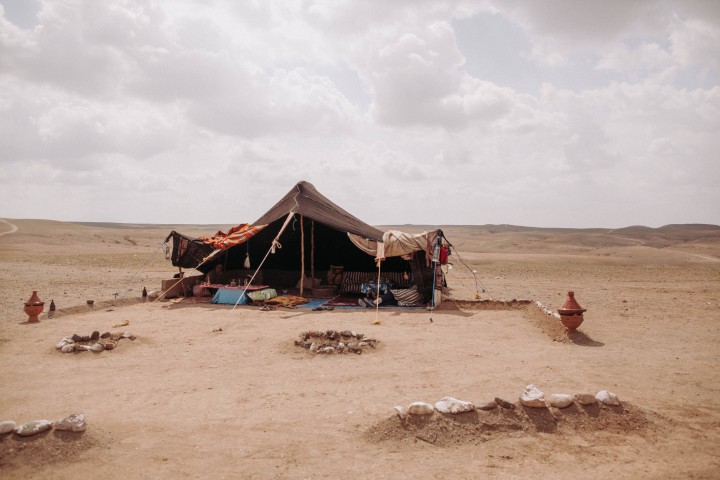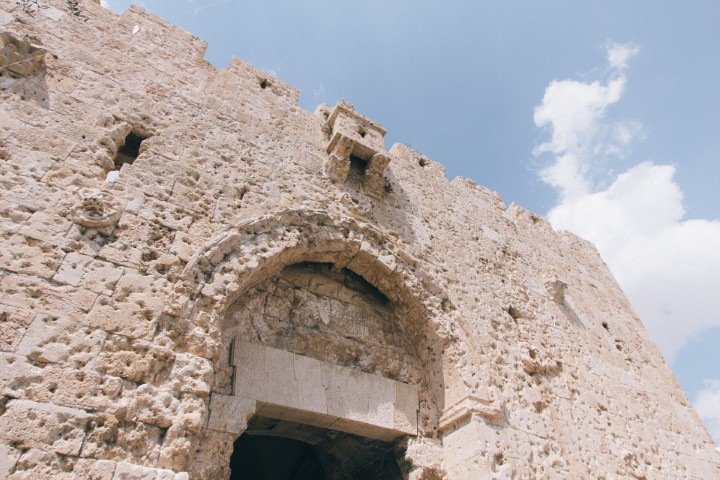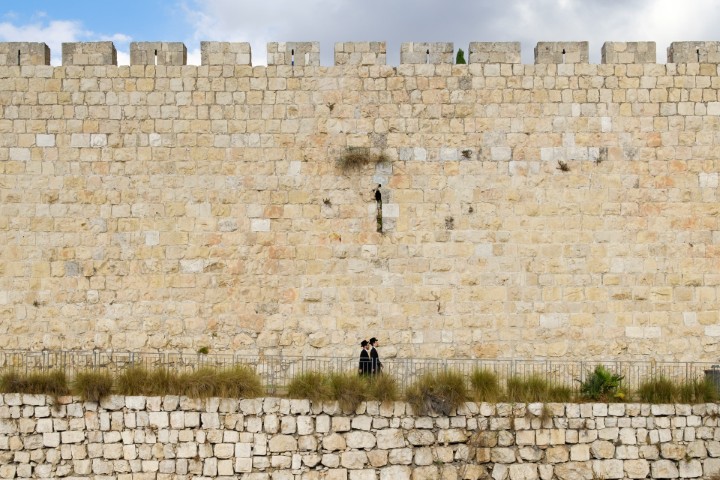
Can receiving the Torah at Mount Sinai really be a moment of both fear and love, coercion and freedom?
Zachary Truboff
f
Lightning streaked through the skies as the crashing of thunder nearly shattered their eardrums. If that wasn’t enough, the sound of a shofar could be heard getting louder and louder with every passing moment. Flames roared from the peak as Mount Sinai was engulfed in smoke. Even simply touching the mountain would result in their deaths. Standing at the bottom, it was as if creation itself was unraveling before them; life and death hung in the balance.
When the Jewish people received the Torah at Mount Sinai, it was both a miraculous and terrifying experience. According to the Talmud (Shabbat 88a), the Jewish people’s fear and dread translated into a sense of coercion. ‘The Holy One, blessed be He, held the mountain over their heads like an inverted cask, and said to them, If you accept the Torah, good; if not, here shall be your burial.’ Completely overwhelmed, they had no choice but to consent to God’s command.
There is, however, a radically different way to understand the moment. In contradiction to the straightforward reading of the narrative, the Rabbis also imagine the receiving of the torah not as a moment of fear and compulsion, but as an act of love and freedom. God raises the mountain over their heads not to threaten them, but to serve as the chuppah for the covenantal marriage between God and the Jewish people.1 In this reading, the giving of the Torah symbolizes a ketubah, the marital contract that seals the covenant between the two sides.2 Instead of recoiling from God’s presence, the Jewish people were rapt with anticipation. They escaped from slavery to follow after their Beloved into the desert and now their mutual love was finally being consummated.
This idea seeps into the mystical consciousness as well. The Zohar explains that on every Shavuot the marriage between God and the Jewish people is renewed once again, and we participate in this through studying torah throughout the night.
Rabbi Shimeon bar Yochai used to sit and learn Torah all night when the bride [the Jewish people] joined with her spouse [God]. It is taught: The members of the bride’s entourage are obligated to stay with her throughout the night before her wedding to rejoice with her. It is their job to adorn her with those perfections by which she is made perfect. [They should] learn Torah, Prophets and Writings, homiletic interpretations of the verses and the secrets of wisdom, for these are her perfections and adornments.3
Studying torah Shavuot night beautifies the Divine presence before God’s marriage to the Jewish people. There is even a Sefardi custom on the first day of Shavuot of publicly reciting a symbolic ketubah. It is a beautiful poetic document from the Middle Ages composed to reflect the unique love that is shared by God and the Jewish people.
Nevertheless, one gets the sense that the holiday of Shavuot struggles with a split personality. Can receiving the Torah at Mount Sinai really be a moment of both fear and love; both coercion and freedom?
The short answer to this question is yes, because love is a strange thing. In the last two centuries, Western culture has developed a very specific notion of romantic love – love is free, love is chosen, and love cannot be commanded. But the reality is more complicated. Love is free, but love also binds. We lose ourselves within it, but love also makes demands upon us and requires loyalty. When we enter into an exclusive love relationship, we are acknowledging that we have new responsibilities and obligations that did not exist before. This is the reason that the bride or groom may get cold feet before their wedding. No matter how much they love the other, they know that by committing to marriage, a covenantal relationship of the highest order, they are entering into a new reality with both radical possibilities and profound burdens. Modern Biblical scholar Jon D. Levenson argues that this notion lies at the heart of the Jewish people’s covenant with God. Throughout the book of Devarim, those who love God are equated with those who serve God wholeheartedly with loyal dedication.4
The German Jewish philosopher Franz Rosenzweig (1886-1929) dedicated much of his intellectual energy to analyzing love and saw it is a central feature of his religious philosophy. In a letter written to his fiancé, he explains that he did not fully understand love until he had experienced it firsthand in his relationship with her. Only after experiencing true love could he recognize its transformative impact on his life.
Do you know you were unable at that time to know ‘the meaning of love’? Because one only knows it when one both loves and is loved. Everything else can, at a pinch, be done one-sidedly, but two are needed for love, and when we have experienced this we lose our taste for other one-sided activities and do everything mutually. For everything can be done mutually; he who has experienced love discovers it everywhere, its pains as well as its delights.5
In his magnum opus, the Star of Redemption, Franz Rosenzweig carefully examined the paradoxical nature of loving God and experiencing God’s love, which is both joyous and terrifying. He raises the question of whether love, an emotion and not an action, can be commanded. Rosenzweig answers:
Of course love cannot be commanded. No third party can command it or attain it by force. No third party can do so, but the One God can. The commandment of love can only come from the mouth of the lover. Only the lover can say and does say: Love me- and He really does! In His mouth, the commandment of love is not an alien commandment. It is nothing other than the voice of love itself…6
Rosenzweig is known for his cryptic and poetic writing, but an earlier section within the book helps clarify his meaning.
…love, of course seizes both, the lover as well as the beloved. But the beloved differently from the lover. It originates in the lover. The beloved is seized, her love is already a response to being seized.7
Love cannot be commanded, but the experience of love changes us. It grips us and penetrates to the very depths of our being. We cannot help but be transformed by it. To be loved by another is to experience a form of command – a demand on the totality of our soul. This is the reason why receiving the torah at Mount Sinai was so challenging for the Jewish people. Experiencing God’s all-encompassing love was terrifying, but also beautiful, uplifting, and full of meaning. The same holds true for the love that we experience in every deep relationship of our lives.
f
On the Shabbat preceding Shavuot, the haftarah is always read from the book of Hoshea. More than any other prophetic work, this book portrays the beauty and tragedy of the Jewish people’s relationship with God. After Mount Sinai, we know that the Jewish people will come to betray God’s love. The loyalty which God’s love demands is too much for them and they seek other opportunities to fulfill their spiritual needs. In order that the prophet Hoshea should understand the depths of the Jewish people’s betrayal, God commands him to marry a harlot who then later leaves him for another man. Nonetheless even after her sin, Hosheah’s love for his wife endures, and he welcomes her back into his home. So too it is the same with God and the Jewish people. God waits for the day when we no longer stray, and when we finally return to Him, we will no longer be afraid. The weight of God’s love will not feel like a mountain hanging over our heads, and instead, we will only feel its warm embrace. The prophet proclaims:
One day the Jewish people will call God (ishi) my husband and not (baali) my master (Hoshea 2:18).
If God is our master, our relationship is built upon fear and therefore it is coercive and at times terrifying. We ultimately strive for something more – that God should be our covenantal partner and not our master. Hoshea further describes the ways in which our love will be expressed:
I will betroth you forever and I will betroth you with righteousness and justice, with goodness and mercy. I will betroth you with faithfulness and you shall know the Lord (Hoshea 2:21-22).
On Shavuot we yearn to experience the love of our Beloved and ultimately to be transformed by it.





